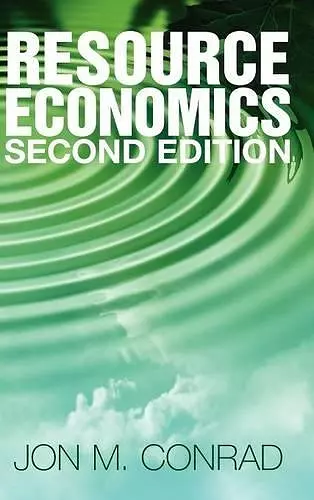Resource Economics
Format:Hardback
Publisher:Cambridge University Press
Published:14th Jun '10
Currently unavailable, and unfortunately no date known when it will be back
This hardback is available in another edition too:
- Paperback£35.99(9780521697675)

Resource Economics is a text for students with a background in calculus and intermediate microeconomics and a familiarity with Excel. It covers basic concepts, shows how to set up spreadsheets to solve simple dynamic allocation problems, and presents economic models for fisheries, forestry, nonrenewable resources, and stock pollutants.Resource Economics is a text for students with a background in calculus and intermediate microeconomics and a familiarity with the spreadsheet software Excel. The book covers basic concepts (Chapter 1), shows how to set up spreadsheets to solve simple dynamic allocation problems (Chapter 2), and presents economic models for fisheries, forestry, nonrenewable resources, and stock pollutants (Chapters 3–6). Chapter 7 examines the maximin utility criterion when the utility of a generation depends on consumption of a manufactured good, harvest from a renewable resource, and extraction from a nonrenewable resource. Within the text, numerical examples are posed and solved using Excel's Solver. Exercises are included at the end of each chapter. These problems help make concepts operational, develop economic intuition, and serve as a bridge to the study of real-world problems in resource management.
'Jon Conrad's second edition of Resource Economics is an articulate, well-organized presentation of key applications of intertemporal economics to problems of natural resources. More than a routine update of the first edition, it admirably balances theoretical rigor and clarity in the presentation of models, with the kinds of institutional discussions that motivate students to think about research questions.' Robert T. Deacon, University of California, Santa Barbara
'This book builds on the already-excellent first edition, with its unique focus on computational solution of dynamic optimization problems, by providing a richer and more detailed discussion of theoretical models of renewable, nonrenewable, and environmental resource management along with very helpful discussion of the intuition behind the models, and applications to resource problems.' Anthony Fisher, University of California, Berkeley
'Jon Conrad's Resource Economics is a unique and indeed indispensable learning resource. It teaches students to work with sophisticated mathematical models using a hands-on, intuitive approach based on the standard spreadsheet tools that are now pervasive in quantitative analysis. Conrad's book sets a standard to which other textbook authors should aspire.' Richard Howarth, Dartmouth University
'Jon Conrad's second edition of Resource Economics is an elegant mathematical treatment of the many complex management issues confronting natural resource managers. The book presents dynamic modeling and optimization in a practical context. The use of Excel throughout the book gives it a concreteness that is lost in purely theoretical texts. It is an ideal advanced text covering the economics of fisheries, forestry, nonrenewable resources, and stock pollutants.' Robert Mendelsohn, Yale University
'Resource Economics is an excellent choice for advanced undergraduates and master's students. The book's use of Excel's solver gives students an intuitive grasp of dynamic optimization without relying on advanced mathematics. Students analyze fisheries, forests, and fossil fuels as they learn spreadsheet programming skills that are valuable in other economics, business, and management courses.' Martin Smith, Duke University
'I wish there had been a textbook such as Jon Conrad's Resource Economics available when I was a young student beginning to learn about natural resource and environmental economics. This is a rigorous but highly accessible mathematical introduction to the field that brings home to the reader the fundamental common threads, as well as the differentiating factors, among nonrenewable, renewable, and environmental resource problems.' Robert N. Stavins, Harvard University
ISBN: 9780521874953
Dimensions: 229mm x 155mm x 23mm
Weight: 610g
300 pages
2nd Revised edition